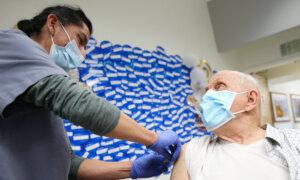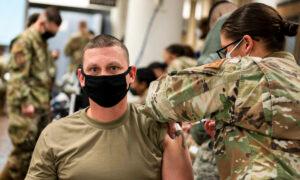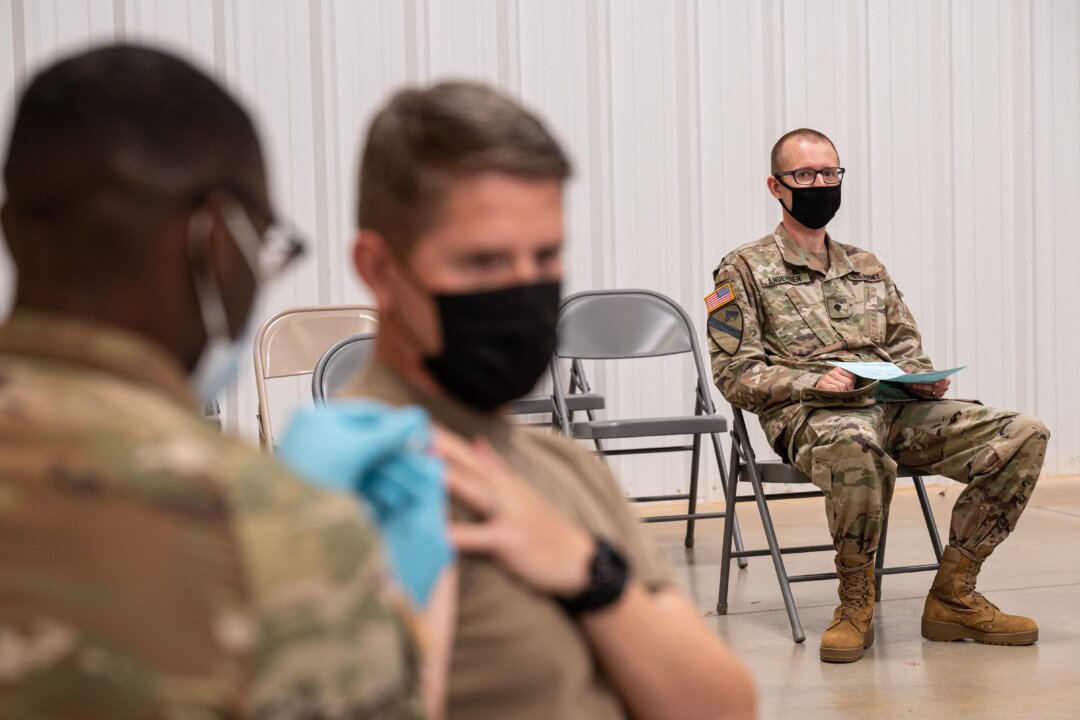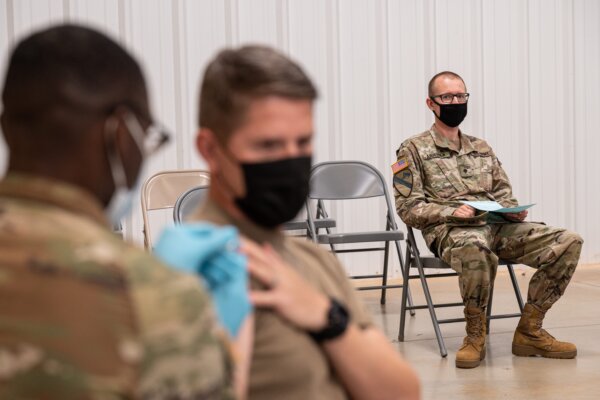Americans More Worried About Safety of COVID-19 Vaccines Than Influenza Shots: Study
Due to public concerns about COVID-19 vaccines, the study advised health professionals to only expect ‘limited demand’ for the jabs.
Many Americans are more concerned about the safety of COVID-19 shots than they are about influenza vaccines, with only 41 percent considering COVID vaccines “very safe,” a recent study shows.
Researchers conducted a survey between July 7 and July 16, 2023, collecting data from 1,430 individuals. Nearly equal shares of respondents claimed that COVID-19 vaccines (42 percent) and influenza vaccines (40 percent) were effective against serious illness or hospitalizations. However, “views diverged on vaccine safety, where a higher share said influenza vaccines are very safe compared with COVID-19 vaccines,” the shares being 55 percent and 41 percent, respectively.
Study respondents’ intentions also differed, with 49 percent saying they are very likely to get an influenza vaccine this season, compared to 36 percent intending to get an updated COVID-19 vaccine.
While 22 percent said they were “not at all likely” to get an influenza shot, the number was higher at 28 percent when it came to COVID-19.
There were “greater shares of COVID-19 vaccine-hesitant adults citing major reasons for hesitancy as wanting more research done, worries about vaccine safety and effectiveness, and believing they are already well-protected through prior vaccination or infection, compared with influenza vaccine-hesitant adults.”
While 60 percent of respondents said they want more research done on the COVID-19 vaccine, only 24 percent wanted the same for influenza vaccines. Fifty-one percent of participants were worried about the safety of COVID-19 shots compared to just 25 percent for influenza.
“In addition, despite the same government agencies and pharmaceutical companies promoting COVID-19 and influenza vaccines, higher shares of COVID-19 vaccine-hesitant adults cited distrust of these agencies and companies.”
Reasons for Vaccine Hesitancy
The study outlined 13 reasons for respondents’ vaccine hesitancy. In 11 out of these 13, people were more hesitant against COVID-19 vaccines than influenza jabs.
The researchers noted that the COVID-19 pandemic was the “largest-scale infectious disease outbreak in a generation” and that vaccines against the disease were developed in “record time” compared to historical standards.
COVID-19 vaccines had a “high safety profile and high effectiveness—greater than that of the influenza vaccine in many years,” they claimed.
“Despite this, US adults, including older adults most at risk of serious illness, are more hesitant about COVID-19 vaccines than influenza vaccines.”
As such, “health professionals should expect limited demand for COVID-19 vaccines and moderate interest in influenza vaccines.”
The researchers asked health care professionals to talk about the “more popular” influenza vaccine when co-administering the shots with COVID-19 vaccines and to provide “consistent messaging on safety and effectiveness of both vaccines.”
The study was conducted by multiple organizations, including the Harvard T.H. Chan School of Public Health.
Author Gillian K. SteelFisher from Harvard disclosed a conflict of interest. Her husband is a minority shareholder in a business that has conducted consulting for pharmaceutical companies. No other disclosures were reported.
The study was funded by the U.S. Centers for Disease Control and Prevention (CDC), the Association of State and Territorial Health Officials (ASTHO), and Harvard’s School of Public Health.
ASTHO had input on the content of the survey questionnaire. Except for this, the funders had “no role” in the study, the authors stated.
Decrease in Vaccine Uptake
In a Nov. 22 post, the CDC admitted that “COVID-19 vaccine uptake is lower than we’d like to see.” Through Nov. 4, only 14 percent of U.S. adults were estimated to have taken the updated shots.
“More than two-thirds of older adults have not gotten an updated COVID-19 vaccine,” the CDC said. Only about 4 percent of children were vaccinated. In nursing homes, about 17 percent were reported to have taken the jabs.
In a breakdown by race, 15 percent of white adults took the updated shots, a number that dropped to just 8 percent for both Hispanic and non-Hispanic black adults.
Half of all adults in the survey said they were not taking precautions such as wearing masks, avoiding large gatherings, or canceling travel plans during the COVID-19 season this fall and winter.
Only 1 in 5 surveyed individuals took the updated COVID-19 vaccines, with 51 percent of respondents saying that they would “probably” or “definitely” not take the shots.
“Experiences from previous doses may also be keeping people from getting the new vaccine, with about a quarter saying that bad side effects from a previous COVID-19 vaccine dose is a reason why they have not gotten the new vaccine,” the report stated.
Some experts are also worried that people’s distrust of COVID-19 vaccines could spill over to other vaccinations as well.
“Our data shows that during the pandemic, there was increased doubt about benefit of vaccines offered by the government and trustworthiness of healthcare provider recommendations,” the study said.
“This may reflect growing public concern regarding the extent of government involvement in the COVID-19 vaccine development process and global distrust for scientific research.”
This article has been archived for your research. The original version from Epoch Times can be found here.






